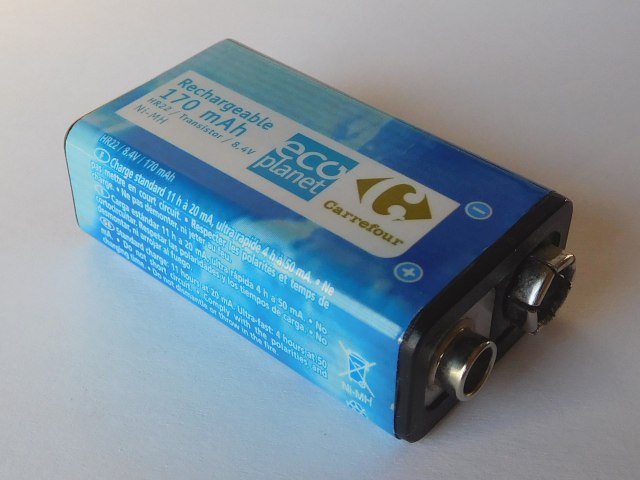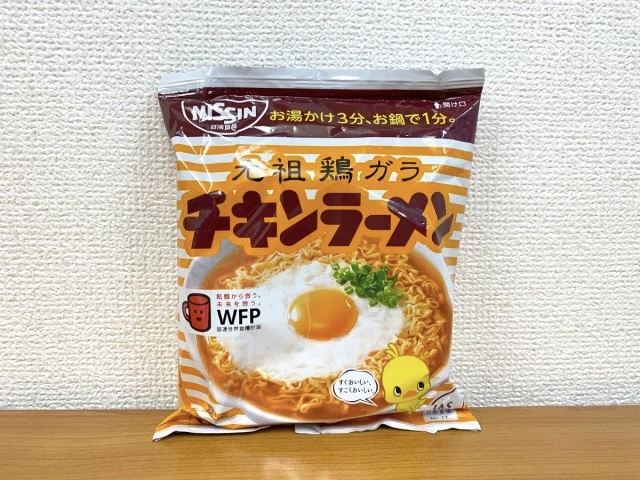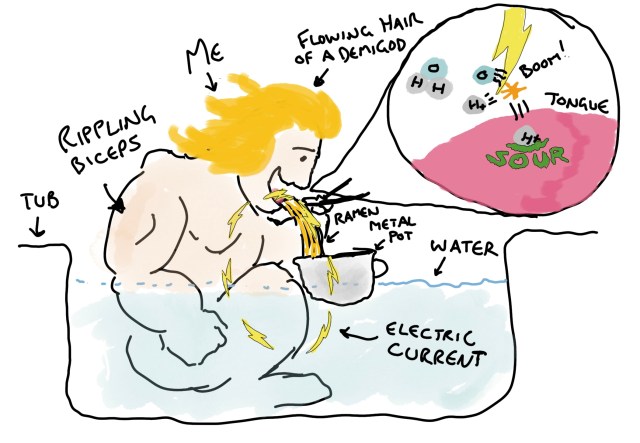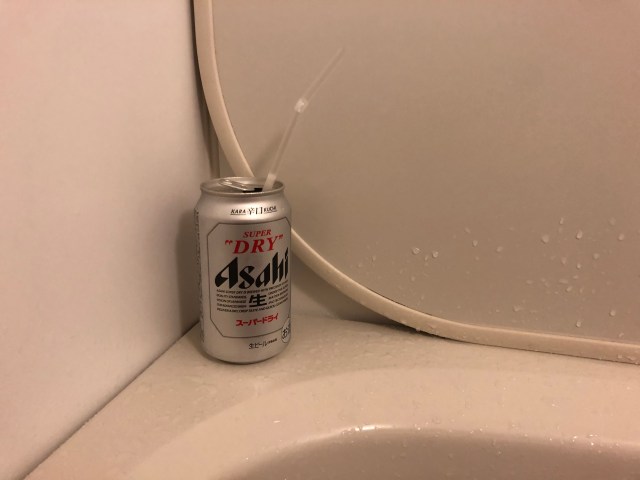
The answer may mildly shock you.
We recently reported on the nearing launch of a bowl and spoon that uses a mild electrical current to make food taste saltier without adding any salt. When the news hit the Internet in Japan, it reminded people of a little theory that went viral earlier this year.
This theory states that if you were to eat ramen out of a metal container while sitting in a bathtub full of water, it will taste “bad.” I suppose the “bad” part is a matter of opinion, but it at the very least suggests a substantial change in flavor will take place. It was pretty intriguing, so I set out to see if it was true.
First I got a bag of the classic Chicken Ramen from Nissin — I wanted to get something with a very standard taste so it was easier to detect any abnormalities, and getting a Cup Noodle seemed like a waste since I’d have to move it to a pot anyway.
After whipping up a pot of chicken ramen and pouring a bath I got ready for some relaxing science. My first breakthrough came in the discovery that a pot of Chicken Ramen floats!
That certainly made for a more relaxing meal, but the big question was the taste. To do this properly according to the Internet theory, I had to eat from the pot while it was partially submerged in water and eat the noodles while they were still touching the other noodles.
I took a first bite and it was immediately clear it tasted quite different. To some people this might be considered a strange or unpleasant taste, but for me it was an all too familiar one.
Kids have all kinds of different hobbies and interests. Some like baseball while others practice the piano, but for me licking 9-volt batteries was THE thing to do in my more formative years, and thanks to this experience I can tell you definitively that eating ramen out of a metal pot in the bathtub tastes just like 9-volt batteries.
▼ Ah, my mouth is watering just looking at one…

So, what’s going on here?
The taste one experiences while licking a 9-volt battery is caused by the water on your tongue undergoing electrolysis. Electrolysis is the process where an electric current creates a chemical reaction, in this case breaking up the water molecules into hydrogen and oxygen. The resulting hydrogen ions have a sharply sour taste to them which causes the rather powerful taste that comes from licking the battery.
The same basic thing is happening while eating ramen this way. When the noodles touch your tongue a circuit is created and the sour taste is generated through electrolysis. Of course, since there’s no external power supply, the current flowing through this circuit is extremely weak, but it’s enough to produce the ions needed for your tongue to detect the taste.
▼ I broke down all the key scientific parts in this easy-to-understand diagram
To verify this, once I removed the pot from the water the sour taste went away and I was right back to eating normal-tasting Chicken Ramen.
▼ Just lifting the pot a millimeter will break the circuit and return the original flavor to the ramen
Purely in the name of science, I also brought a beer in the bath with me. It would seem that if I drank it through the straw while the can was in the water, the same effect would be generated. However, it tasted exactly the same in the water and outside of it.
I’m not sure why the ramen worked but the beer didn’t. Perhaps the noodles were more conductive or possibly the beer was moving past my tongue too fast for it to properly detect the ions.
▼ Either way, I ain’t complaining. I got everything I need right here.
Also, this isn’t exactly the same process that occurs when using the utensils developed by Kirin Holdings. Those items use electricity to stimulate the salty ions present inside the food, while this ramen trick appears to be stimulating your own saliva more than the food itself, which is why you get more of a sour taste than a salty one.
Nevertheless, I can conclude without a doubt that eating ramen out of a metal pot while sitting in the bathtub definitely changes the taste. I’m not sure I would say it tastes bad, but it’s not especially good either. But with 9-volt batteries becoming increasingly rare these days, it’s a nice touch of nostalgia and a fun science experiment to do on a rainy day.
Images: © SoraNews24 (Unless otherwise noted)
● Want to hear about SoraNews24’s latest articles as soon as they’re published? Follow us on Facebook and Twitter!








 Super ramen! What happens when you combine 19 different types of supermarket ramen?【SoraKitchen】
Super ramen! What happens when you combine 19 different types of supermarket ramen?【SoraKitchen】 Pot Noodles prove too much for Japanese taste buds
Pot Noodles prove too much for Japanese taste buds Natto-infused ramen is a thing — we tried it, we love it【Taste test】
Natto-infused ramen is a thing — we tried it, we love it【Taste test】 We try the new Zero-Second Chicken Ramen: Is it worth the hype?【Taste Test】
We try the new Zero-Second Chicken Ramen: Is it worth the hype?【Taste Test】 New Zero-Second Chicken Ramen leaves us zero reasons not to be eating ramen right now
New Zero-Second Chicken Ramen leaves us zero reasons not to be eating ramen right now Highest Starbucks in Japan set to open this spring in the Tokyo sky
Highest Starbucks in Japan set to open this spring in the Tokyo sky Krispy Kreme set to release new “Sweet America” range of doughnuts in Japan
Krispy Kreme set to release new “Sweet America” range of doughnuts in Japan Japan’s 30 Best Selling Video Games of All Time
Japan’s 30 Best Selling Video Games of All Time McDonald’s ad in Japan causes controversy overseas
McDonald’s ad in Japan causes controversy overseas Foreign tourists in Japan will get free Shinkansen tickets to promote regional tourism
Foreign tourists in Japan will get free Shinkansen tickets to promote regional tourism Conan O’Brien sits down for a traditional kaiseki meal with Jordan Schlansky in Japan 【Video】
Conan O’Brien sits down for a traditional kaiseki meal with Jordan Schlansky in Japan 【Video】 SoraReview: Mary and the Witch’s Flower, the newest anime from Studio Ghibli director Yonebayashi
SoraReview: Mary and the Witch’s Flower, the newest anime from Studio Ghibli director Yonebayashi The Sailor Moon theme song is based on another song about drinking a lot of tequila【Video】
The Sailor Moon theme song is based on another song about drinking a lot of tequila【Video】 Is the two-hour wait for Tokyo’s Yokota Gaijin Burger worth it?【Taste test】
Is the two-hour wait for Tokyo’s Yokota Gaijin Burger worth it?【Taste test】 Saitama is home to the best strawberries in Japan that you’ve probably never even heard of
Saitama is home to the best strawberries in Japan that you’ve probably never even heard of The 10 most annoying things foreign tourists do on Japanese trains, according to locals
The 10 most annoying things foreign tourists do on Japanese trains, according to locals Starbucks Japan releases new sakura goods and drinkware for cherry blossom season 2026
Starbucks Japan releases new sakura goods and drinkware for cherry blossom season 2026 Naruto and Converse team up for new line of shinobi sneakers[Photos]
Naruto and Converse team up for new line of shinobi sneakers[Photos] Is Sapporio’s Snow Festival awesome enough to be worth visiting even if you hate the snow? [Pics]
Is Sapporio’s Snow Festival awesome enough to be worth visiting even if you hate the snow? [Pics] Japan has trams that say “sorry” while they ride around town…but why?
Japan has trams that say “sorry” while they ride around town…but why? Tokyo Skytree turns pink for the cherry blossom season
Tokyo Skytree turns pink for the cherry blossom season Sakura Totoro is here to get spring started early with adorable pouches and plushies
Sakura Totoro is here to get spring started early with adorable pouches and plushies Poop is in full bloom at the Unko Museums for cherry blossom season
Poop is in full bloom at the Unko Museums for cherry blossom season Shibuya Station’s Hachiko Gate and Yamanote Line stairway locations change next month
Shibuya Station’s Hachiko Gate and Yamanote Line stairway locations change next month Japan’s new “Cunte” contact lenses aren’t pronounced like you’re probably thinking they are
Japan’s new “Cunte” contact lenses aren’t pronounced like you’re probably thinking they are Japan’s newest Shinkansen has no seats…or passengers [Video]
Japan’s newest Shinkansen has no seats…or passengers [Video] Foreigners accounting for over 80 percent of off-course skiers needing rescue in Japan’s Hokkaido
Foreigners accounting for over 80 percent of off-course skiers needing rescue in Japan’s Hokkaido Super-salty pizza sends six kids to the hospital in Japan, linguistics blamed
Super-salty pizza sends six kids to the hospital in Japan, linguistics blamed Starbucks Japan unveils new sakura Frappuccino for cherry blossom season 2026
Starbucks Japan unveils new sakura Frappuccino for cherry blossom season 2026 Take a trip to Japan’s Dododo Land, the most irritating place on Earth
Take a trip to Japan’s Dododo Land, the most irritating place on Earth Is China’s don’t-go-to-Japan warning affecting the lines at a popular Tokyo gyukatsu restaurant?
Is China’s don’t-go-to-Japan warning affecting the lines at a popular Tokyo gyukatsu restaurant? Survey asks foreign tourists what bothered them in Japan, more than half gave same answer
Survey asks foreign tourists what bothered them in Japan, more than half gave same answer Japan’s human washing machines will go on sale to general public, demos to be held in Tokyo
Japan’s human washing machines will go on sale to general public, demos to be held in Tokyo Starbucks Japan releases new drinkware and goods for Valentine’s Day
Starbucks Japan releases new drinkware and goods for Valentine’s Day We deeply regret going into this tunnel on our walk in the mountains of Japan
We deeply regret going into this tunnel on our walk in the mountains of Japan Studio Ghibli releases Kodama forest spirits from Princess Mononoke to light up your home
Studio Ghibli releases Kodama forest spirits from Princess Mononoke to light up your home Major Japanese hotel chain says reservations via overseas booking sites may not be valid
Major Japanese hotel chain says reservations via overseas booking sites may not be valid Put sesame oil in your coffee? Japanese maker says it’s the best way to start your day【Taste test】
Put sesame oil in your coffee? Japanese maker says it’s the best way to start your day【Taste test】 No more using real katana for tourism activities, Japan’s National Police Agency says
No more using real katana for tourism activities, Japan’s National Police Agency says What does vegan ramen taste like? We try Veggie Brown Rice Ramen
What does vegan ramen taste like? We try Veggie Brown Rice Ramen Gyoza ramen! Two of Japan’s best comfort foods in one bowl at innovative restaurant【Taste test】
Gyoza ramen! Two of Japan’s best comfort foods in one bowl at innovative restaurant【Taste test】 Bring-your-own-pot ramen takeout service starts at Tokyo restaurant【Photos】
Bring-your-own-pot ramen takeout service starts at Tokyo restaurant【Photos】 We try Taiwan’s newest taste sensation: Pudding Ramen!
We try Taiwan’s newest taste sensation: Pudding Ramen! Matcha green tea instant Cup Noodle ramen is here, with a totally unexpected taste【Taste test】
Matcha green tea instant Cup Noodle ramen is here, with a totally unexpected taste【Taste test】 Pikachu ramen topping instantly makes your instant noodles twice as much fun to eat【Photos】
Pikachu ramen topping instantly makes your instant noodles twice as much fun to eat【Photos】 KFC Japan releases official Kentucky Fried ramen recipe, other Japanese-inspired cooking ideas
KFC Japan releases official Kentucky Fried ramen recipe, other Japanese-inspired cooking ideas Since chocolate ramen was so good, we went back for … strawberry ramen! 【Taste Test】
Since chocolate ramen was so good, we went back for … strawberry ramen! 【Taste Test】 Can you make a good chicken ramen broth with KFC fried chicken?
Can you make a good chicken ramen broth with KFC fried chicken? Cat Lover’s Ramen: Do these instant noodles taste like…cat?
Cat Lover’s Ramen: Do these instant noodles taste like…cat? Restaurant-quality frozen ramen that doesn’t need water added to go on sale 20 February
Restaurant-quality frozen ramen that doesn’t need water added to go on sale 20 February Introducing Nomen: Ramen without the noodles【Taste test】
Introducing Nomen: Ramen without the noodles【Taste test】 We try the “longest ramen in history”【Taste test】
We try the “longest ramen in history”【Taste test】 Tokyo’s new frozen ramen vending machines are brain-breakingly amazing【Taste test】
Tokyo’s new frozen ramen vending machines are brain-breakingly amazing【Taste test】 Does eel ramen really taste like eel?
Does eel ramen really taste like eel?